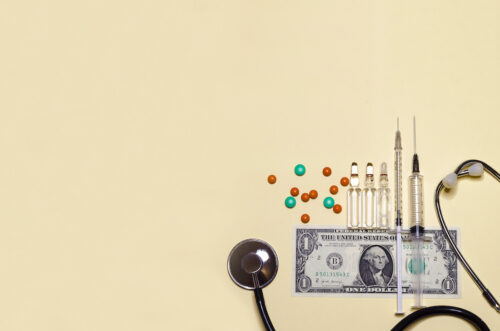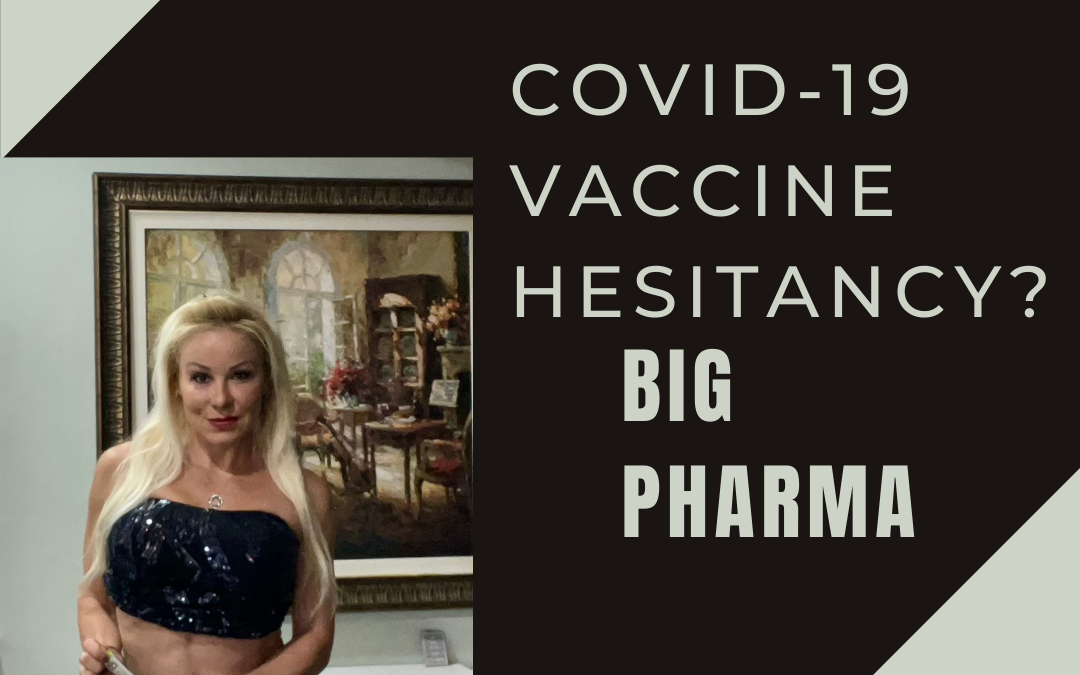In my article, Our Social Atmosphere and The Inception of COVID “Vaccines,” I delved into the social environment of fear created around SARS-CoV-2 as well as death rates, and treatment. Now that vaccine mandates have been introduced around the world, it’s important to look at some of the reasons that can cause COVID-19 “vaccine” hesitancy. Previous posts dealt with vaccine safety, medical effectiveness, medical ethics, mandates, incentives, emergency use authorization, and Fauci. Now, let’s explore the role of big pharma.
The pharmaceutical industry is referred to as big pharma for many reasons. Over the past few decades, the pharmaceutical industry has gained a great deal of power and influence in the United States. It has done so by infiltrating and converging with diverse industries and top people in society. Read on to learn more about pharma’s most prominent conflict of interests, criminal and unethical behaviors, modus operandi, and business models surrounding COVID-19 “vaccines.”
Conflicts of Interest
Unethical entanglements with politicians (mayors, governors, presidents, members of congress and senate, and other legislators), Dr. Fauci, the FDA and CDC, the medical industry, researchers, and mainstream media have created corruption at many levels.
Pharma and Members of Government / Elected Officials
On one hand, close relations between pharma and politicians/legislators/bureaucrats pose a major conflict of interests. These relationships directly influence those who make recommendations and pass legislation related to pharmaceuticals. This is one of the reasons why pharmaceutical companies are exempt from liability with many of their products. Pharmaceutical lobbyists have contributed greatly to pharma’s acquisition of power in Washington and local governments ⤵️
- Pharmaceutical lobbyists fundraise and contribute money to politicians’ campaigns (senators, congressmen, etc.). Once that government official receives money from them, he/she knows how to vote on upcoming bills and policies – Even Joe Biden’s presidential campaign received over $256,520 from Pfizer during the past election.
- According to OpenSecrets.org, which tracks federal campaign contributions and lobbying data, pharmaceutical lobbying spending reached $299 million in 2019 and a record $306 million in 2020.
- Contributions target senior legislators in congress and state committees involved in drafting health care laws and key referenda on drug pricing and regulation. Between 1999 and 2018, the pharmaceutical industry spent in lobbying $4.7 billion ($233 million per year to the US federal government; $414 million to presidential and congressional electoral candidates, national party committees, and outside spending groups; and $877 to state candidates and committees).
- According to Forbes, AbbVie, AstraZeneca, Bristol-Myers Squibb, Johnson & Johnson, Merck, Pfizer, and Sanofi contributed over $1.6 million to the campaign committees of 27 out of 28 members of the Senate Finance Committee in 2018 [Senators Bob Casey (D-Pennsylvania), Mike Crapo (R-Idaho), Rob Portman (R-Ohio), Johnny Isakson (R-Georgia), Tim Scott (R-South Carolina), and Tom Carper (D-Delaware) received the largest contributions].
- The biggest pharma lobbyists are Biotechnology Innovation Organization, Pfizer, Avv bie, Merk, Bayer, Eli Lilly & Co., and Johnson & Johnson. Keep that in mind if you use their pharmaceutical products

Pharma and Government Agencies
On another hand, the pharmaceutical industry has gained power and influence through dealings with high-ranking bureaucrats and federal and national agencies. Even though these relationships are mutually beneficial for them, they are unsafe for Americans ⤵️
- Dr. Fauci [the director of the National Institute for Allergy and Infectious Disease (NIAID) & Member of the White House Coronavirus Task Force]: Fauci has ties to pharmaceutical companies. He, along with the NIH, is a co-reviewer and co-owner of the Moderna “vaccine.” Moderna’s clinical trials were founded on taxpayers’ money.
- Fauci has many ties to Pfizer as well: Pfizer, another major pharma company providing COVID-19 “vaccines”, has had a symbiotic relationship with the National Institutes of Health for years via collaboration, working on each other’s projects. They, also, engage in royalty payments, such as in 2005 when NIH’ scientists received $8.9m.
- Fauci is linked to Remdesivir: In 2020, when people were getting positive results by treating the virus with Ivermectin and hydroxychloroquine, Fauci smeared these cheap drugs and banned their availability. He aggressively pushed Remdesivir, an expensive drug that the NIH heavily invested in and one that he has a patent on. Months later, it was approved by the FDA and recommended to treat SARS-CoV-2, even though remdesivir went through clinical trials and showed lethal side effects (in 2018 for Ebola and in 2020 in China – 54% of the experimental group receiving this drug died). When used to treat COVID, 25.9% of patients receiving remdesivir die!
- CDC: The Centers for Disease Control and Prevention (CDC) has licensing agreements and gets money from pharmaceutical companies. Members of the CDC’s Vaccine Advisory Committee receive money, share patents, and collaborate with manufacturers. Those individuals receiving contributions from pharma are the ones making recommendations on policies and upcoming pharmaceutical products.
- FDA: Top pharmaceutical companies employ former FDA commissioners. These former top-ranking government officials are now board members or have high-level executive positions in Johnson & Johnson, Pfizer, and Moderna.
- FDA: One of the top pharmaceutical lobbyists is Pharmaceutical Research & Manufacturers of America – PhRMA, which spent $25.9 million in 2020. PhRMA also runs a nonprofit, the PhRMA Foundation. Even though the Food and Drug Administration can’t accept corporate money, it receives money from nonprofits. The PhRMA Foundation gives grants for research that are funneled to get to the FDA.
- FDA: Pharma companies underwrite 75% of the FDA’s budget for scientific reviews, compared to 27% thirty years ago. Pharma contributes to the salaries of FDA’s drug reviewers in exchange for time limits on reviews. This is one of the reasons why the agency fast-tracks expensive drugs with significant side effects and unproven health benefits, just like they did with COVID-19 “vaccines.”
- FDA Advisory Committees: Members of FDA’s scientific advisory committees receive money and research support from pharma. Between 2013 and 2016, they received more than $26 million. These are the same people who vote for or against the approval of drugs.
- Pharmacy Schools: Schools of Pharmacy also receive endowments from the Food and Drug Administration Alumni Association (FDAAA).
- Sheriffs: PhRMA gives money to the Partnership for Safe Medicines, which in 2019 gave the National Sheriffs’ Association at least $900,000 in grants.
- Federal Non-Profits: The Reagan-Udall Foundation received a $150,000 grant from the PhRMA Foundation in 2020. Reagan-Udall is a nonprofit created by Congress to support scientific research of interest to the FDA, and it is supposed to be unbiased.
Pharma and The Medical Industry
Simultaneously and with the same dangerous results for the public, big pharma is directly involved in medical research and physicians’ practices ⤵️
- Doctors are a huge part of the puzzle. Money from the pharmaceutical industry in medical education and practice influences medical doctors to prescribe and promote pharmaceutical products. Physicians receive payments from the pharmaceutical and medical device industries on the regular basis. In 2015, it amounted to $2.4 billion, which encouraged doctors to prescribe pricey brand-name drugs. Payments are done in money ($1.8 billion), ownership interests like stock options and partnership shares ($544 million), research ($75 million), royalty or license payments ($484 million), and service fees ($472 million).
- Researchers and academics play another big part in the narrative of the medical system. Scientific researchers have financial ties to pharmaceutical companies. This compromises the integrity and objectivity of scientific research. Contributions to universities and medical institutions help develop scientists and doctors who spread a highly supportive message toward the drug industry. Consequently, scientists, professors, and academics, who are compensated by pharma, author studies that generally show drugs as highly efficaciousy while ignoring safety issues.

Pharma and Mainstream Media
A leading conflict of interest, that has increased the power and influence of the pharmaceutical industry, is the marriage of pharmaceutical companies to media corporations. This is how pharma is able to manipulate the public with its sponsored content. Besides, this is why topics related to the independent and unbiased analysis of pharmaceuticals’ safety and efficacy are never brought to the forefront ⤵️
- Every major media outlet in the US shares at least one board member with at least one drug company. These board members go to meetings at their pharma companies and then to meetings at media corporations to plan the programming that the network airs. Only non-corporate independent media outlets are able to run stories and “news” that conflict with big pharma’s agenda.
- Big pharma contributes 70% of ad revenue for major news networks. This is why you rarely hear in mainstream media anything related to the tremendous numbers of vaccinated people getting infected by the virus or to the thousands and thousands of people who have died or experienced adverse effects after receiving the covid shot.
Pharmaceutical Companies’ Modus Operandi
In addition to the conflicts of interest that the pharmaceutical industry has created in many spheres, its advertisement practices, criminal conduct, product guarantee, and business model are aspects that could cause concern about the industry and its products.
Advertisement Practices
Pharmaceutical companies engage in false advertisement practices on the regular basis. For instance, the current COVID-19 “vaccines” were marketed as a vaccine, not mRNA gene therapy. Pharmaceutical companies, along with the government, knew that referring to the covid shot for what it is (gene therapy) would elicit hesitancy. They called them vaccines so people would relate to them since vaccines are part of our lives, and are required to function in society at many levels.
This tactic violates federal law. mRNA vaccines don’t meet the standard medical and/or legal definition of a vaccine. Calling them vaccines and advertising them as such, is deceptive. This violates 15 U.S. Code Section 41 of the Federal Trade Commission Act, which covers medical advertisement.
At the same time, marketing COVID-19 “vaccines” as “safe” is another advertisement violation. These experimental products are still going through clinical trials and didn’t go through animal trials – as all pharmaceutical products are supposed to do. COVID-19 “vaccine” manufacturers don’t have all the data related to their potential side effects. Therefore, COVID shots shouldn’t be advertised as safe at this point.
As a matter of fact, we are seeing the opposite. As of January 14, 2022, there have been 1,915,357 people who have suffered adverse reactions and over 22,193 people have died soon after receiving the shot.
Another unethical advertisement is referring to these “vaccines” as effective. This leads people to believe that if they take them, they are protected from the virus. However, the rate of infection in highly vaccinated populations shows us otherwise.
These “vaccines” were tested for symptom amelioration to the virus. They haven’t been tested or proven to prevent infection or transmission. In actuality, studies of 68 countries and 2,947 American counties show that countries and cities with high rates of vaccinated people have higher rates of SARS-CoV-2 infection. For instance, Vermont where 74% of the population is fully vaccinated has huge numbers of coronavirus infections and hospitalizations.
Pharmaceutical Companies’ Rap Sheets
You may not know but many pharmaceutical companies are not only criminals but repeated felons ⤵️
- Pharmaceutical companies regularly engage in criminal behavior. Generally, these companies avoid going to trial when charged with unethical criminal conduct and opt for negotiating settlements. This allows them to deny any wrongdoing and pay people off to make the charges go away. They can afford millions in fines since they make astronomical amounts of money.
- Pharmaceutical companies have paid over $35 billion to resolve criminal charges and civil liability lawsuits due to damages and fines for falsifying science and documents, defrauding regulators, bribing and deceiving doctors, corrupt and fraudulent marketing practices, suppressing adverse trial results, and killing thousands of people all over the world in the last 10 years. Pfizer paid the highest fine in their industry – a $2.3 billion dollar settlement.
- Most of the pharmaceutical companies that developed COVID-19 “vaccines” have extensive rap sheets: Pfizer, Johnson & Johnson, GlaxoSmithKline, AstraZeneca, Novartis, Merck.
- Another crime against Americans is how big pharma fueled the opioid crisis that has killed thousands. According to the CDC, there were 93,000 opioid overdose deaths in 2020, a 30% increase from the previous year. Opioid overdoses accounted for 66% of the deaths, more deaths than car crashes, gun violence, and HIV/AIDS combined. Pharmaceutical companies that manufactured synthetic opioids, such as fentanyl and OxyContin, push them to doctors and compensate them generously. The drugs have been advertised as having no risk for addiction or abuse, even though they are 50 times stronger than heroin.
Liability & Product Guarantee

Pharmaceutical companies have zero liability status in relation to most vaccines. These private for-profit companies have total immunity. Since the 1980s, childhood vaccine manufacturers have been protected from liability under the National Childhood Vaccine Injury Act of 1986. This program took place due to the fact that vaccine manufacturers were losing millions of dollars because they were being sued regularly, and rightfully so when vaccinated children got adverse reactions. Under the program’s protection, they are not liable for deaths or injuries anymore.
Additionally, the government passed the Public Readiness and Emergency Preparedness Act (PREP Act) in 2005. The PREP Act further protects these companies from financial risk and shields them from liability when they launch a product, under a public health emergency, that causes injuries.
The only option for compensating injured people is the Countermeasures Injury Compensation Program (CICP), which is a poor solution. The CICP doesn’t cover legal or medical expert fees, lost wages are capped at $50,000, victims are not awarded compensation due to pain and suffering, and there is no judicial appeal if the claim is invalidated. Only eight percent of petitioners have been awarded compensation since 2010.
The current system, not only neglects and severely under compensates individuals who suffer adverse effects, it enriches pharmaceutical companies. Plus, current deals with legislators offer no incentives for these companies to do real safety testing, allowing them to endanger the lives and health of millions of children and adults.
Can you trust a company that doesn’t guarantee its products?
Pharmaceutical companies don’t guarantee what they produce. Any other company in any other industry that brings a product to market that injures or kills people is liable for its product. Pharmaceutical companies are immune from liability.
Would you buy a car from a company that has a pattern of producing cars that are defective and cause people to crash and die? Would you buy a car from a manufacturer that doesn’t give you a warranty and doesn’t take responsibility for their cars? Would you put your life and the life of your loved ones on the line? Maybe not everyone who buys a car from that company gets the malfunctioning car that causes crashes or deaths, but many of them do. Are you willing to play Russian Roulette?
Business Model of COVID-19 “Vaccine” Companies
Having a highly profitable business model can be the envy of many, in a good way. However, having businesses that make huge profits, run at the expense of taxpayers, and have total impunity in regards to their products doesn’t seem right.
Let’s take a look at the business models of the pharmaceutical companies that are developing COVID-19 “vaccines”:
- Research and Development (R&D): Taxpayers provided the money needed to research and develop their drugs
- Manufacturing: Citizens’ money contributed to the manufacture of these “vaccines”
- Marketing: The government not only advertises these products through massive media campaigns but is forcing and coercing people to take the shots
- Customer Pipeline: These “vaccines” along with all their doses and boosters ensure a constant influx of customers. Subsequently, pharmaceutical companies also profit from the drugs they bring to market that are created to treat the side effects that their own products caused in the first place.
- Zero Liability: Pharmaceutical companies can’t get sued if people get injured or die after taking the COVID shot
In our country, having a successful and profitable business is the target for most entrepreneurs and business people. However, having lucrative results at the expense of taxpayers and their health should never be a goal. As a matter of fact, it’s despicable.
Are You Hesitant to Get COVID-19 “Vaccines”?
Pharmaceutical companies have compromising relationships with politicians, legislators, members of congress, national agencies, doctors, researchers, the mainstream media, Dr.Fauci, and even the president. All these entanglements have contributed to big pharma’s great power and influence and have created huge conflicts of interests that are unsafe for Americans’ health and liberties.
Key issues to reflect upon:
- Pharmaceutical lobbyists spent a record $605 million in 2019 and 2020
- Did contributions to legislators, politicians, Dr. Fauci, and the president influence the institution of the state of emergency and the ongoing mandates?
- Did these relationships cause the push for the COVID-19 “vaccine” and the never-ending boosters as opposed to the institution of campaigns to help the American people become healthier?
- Can you trust that the NIH, FDA, CDC, and Fauci to evaluate pharmaceutical products objectively?
- Aren’t money, patents, and stocks such powerful influencers that bias the opinions of medical doctors? Isn’t the mutually beneficial financial relationship between many doctors and pharma call into question their integrity and credibility?
- Do the financial entanglements between mainstream media and pharma prompt news channels to avoid full transparency and obscure the truth about pharmaceutical products? Doesn’t this cause skepticism about what is being reported?
- Isn’t the credibility of scientific research findings published in medical journals compromised when scientists, researchers, and academics have financial ties to the companies they are trying to evaluate?
- Isn’t it time to prohibit financial relationships between the pharmaceutical industry and national institutions, individuals in government, candidates, researchers, and doctors?
- Do pharma’s false advertising practices prompt people to line up to take an experimental gene therapy that they know nothing about?
- Did the fear-mongering campaigns and constant promotion of these “vaccines” by mainstream media contribute to people’s full acceptance and compliance with the pharmaceutical agenda and the demonization and censorship of those who didn’t embrace vaccines as the sole solution to the virus?
- After knowing that pharmaceutical companies have zero liability but have financial relationships with Dr. Faici, President Biden, legislators, the medical industry, and mainstream media, do you feel safe taking the COVID-19 “vaccine?”
If you are hesitant to get the COVID “vaccine,” you may be right to be. Pharmaceutical companies’ unscrupulous and criminal behavior as well as their unethical merging with politicians, legislators, the CD, the FDA, Dr. Fauci, and the media conglomerates are matters of concern. Our current state of affairs relegates Americans and puts our well-being and rights on the back burner. These tremendous conflicts of interest should make us pause before trusting any pharmaceutical blindly.
To a Fitter Healthier You,
The Fitness Wellness Mentor
Check out this great 16-minute video from Children’s Health Defense exposing what has been transpiring!



